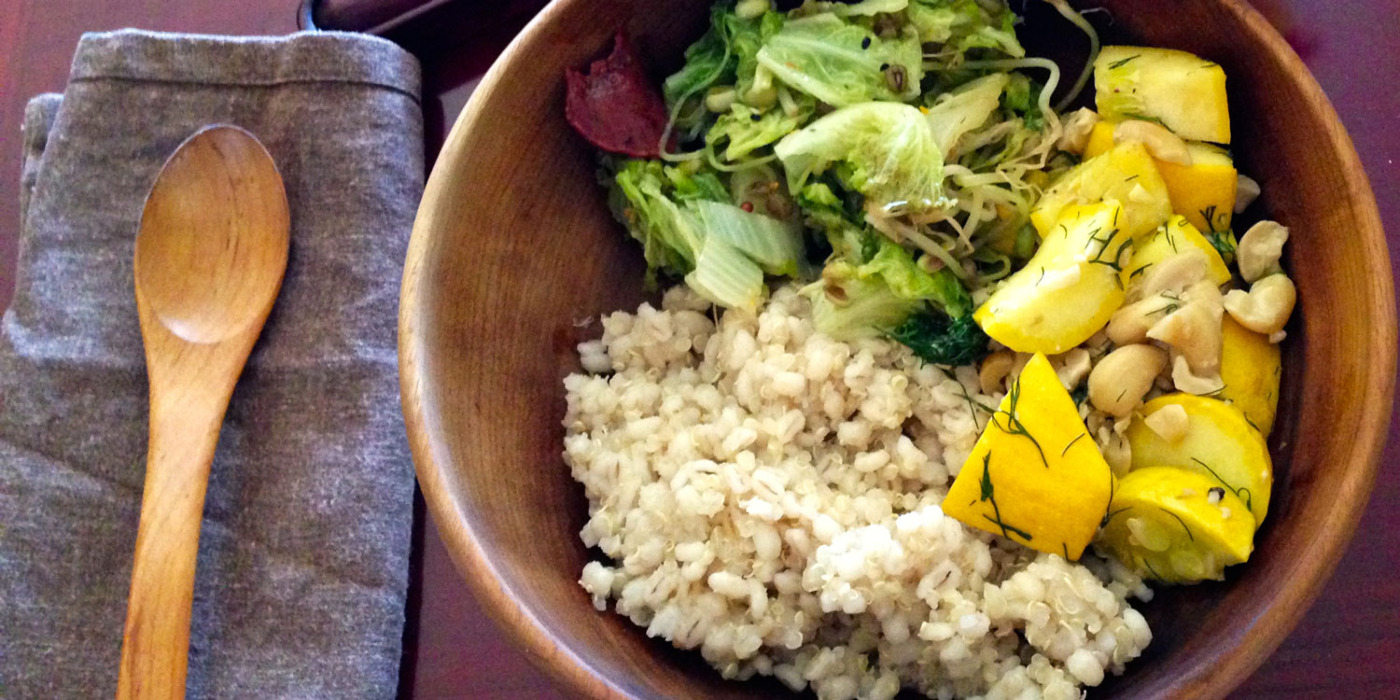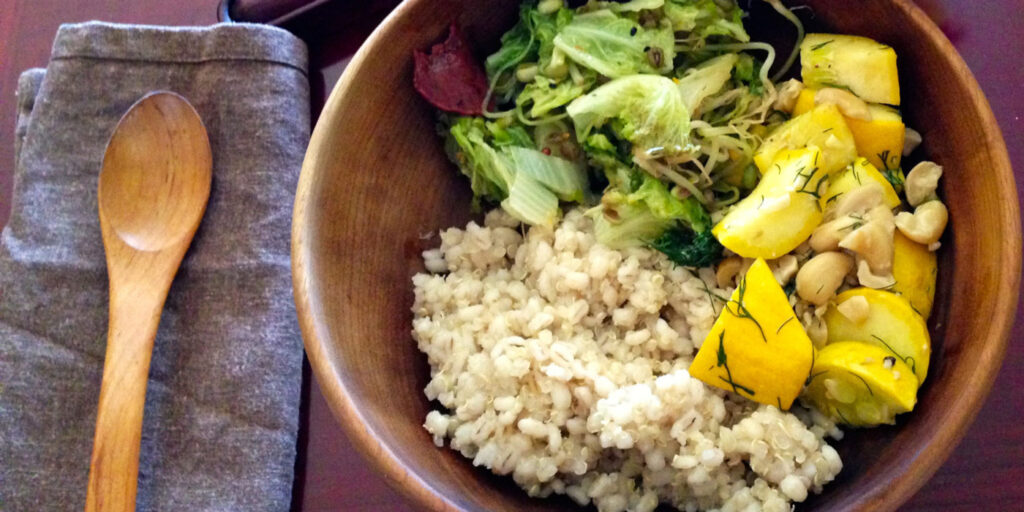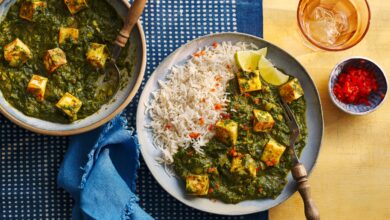Ayurveda Dinner: Your Secret to a Harmonious Life

wellhealthorganic.com:ayurveda-dinner – Welcome to the world of Ayurveda, a comprehensive healing system with deep roots in India’s cultural past. Ayurveda goes beyond mere physical health; it harmonizes the body, mind, and spirit, guiding us towards a holistic way of living.
The essence of Ayurveda lies in understanding the body’s constitution, known as ‘Prakriti’. This is a unique mix of the three doshas – Vata, Pitta, and Kapha, which form the biological energies that govern our physical and mental processes. When these doshas are in balance, we enjoy good health, but imbalance can lead to illness.
This ancient science places great emphasis on the food we eat, dubbing it as ‘medicine’. Ayurveda teaches that food plays a crucial role in maintaining the balance of the doshas. By tailoring our diet to our unique constitution and eating mindfully, we can promote physical wellness and spiritual growth.
Understanding Ayurveda: An Ancient Healing System
Ayurveda, the “science of life,” is an ancient Indian medicinal system that has been healing humanity for over 5000 years. The holistic approach of Ayurveda makes it unique, addressing not just the symptoms of illness, but the root causes. Its guidelines for healthy living and natural healing methods have stood the test of time, providing timeless wisdom for wellbeing.
Ayurveda and Food: The Essential Connection
In Ayurveda, food is medicine, capable of healing our bodies from the inside out. The practice considers the role of diet to be so significant that it can either cause disease or cure it. When our diet aligns with our Prakriti and the season, our digestion improves, providing our bodies with the essential nutrients they need for optimal function.

Principles of Ayurvedic Eating
Ayurveda outlines six tastes: sweet, sour, salty, bitter, pungent, and astringent. Each has different effects on the doshas, and incorporating all six in our meals ensures balance. Additionally, Ayurveda promotes eating in a peaceful environment, focusing on the food to improve digestion.
We’ll need to continue with the rest of the blog in a similar manner, but do note that SEO optimization involves a lot more than just writing a post. This includes keyword research and optimization, meta tags, backlinks, user engagement, and regular updates to the content. Be sure to keep these in mind as you prepare your blog post for publication.
The Significance of an Ayurveda Dinner
Dinner, in the context of Ayurveda, is more than just your last meal of the day. It’s a vital component of daily routines, known as Dinacharya, that promote health and longevity. A proper Ayurvedic dinner is crafted to balance your doshas, cater to your body’s needs, and prepare you for a restful sleep.
Ayurveda’s Three Doshas: Vata, Pitta, and Kapha
At the heart of Ayurveda are the three doshas – Vata, Pitta, and Kapha. These are life forces that govern all bodily functions. Vata is associated with movement, Pitta with metabolism, and Kapha with structure and stability. Balancing these doshas through diet is a key principle in Ayurveda.
How Ayurvedic Dinners Balance the Doshas
An Ayurvedic dinner is designed with your unique dosha balance in mind. Foods are carefully selected and prepared to balance the doshas. For instance, Vata types might need grounding foods like root vegetables, while Pitta types might need cooling foods like cucumber and melon, and Kapha types might benefit from light and stimulating foods like leafy greens and spices.
Timing Your Ayurveda Dinner for Optimal Health
Ayurveda suggests having dinner well before bedtime, ideally before sunset or at least two hours before sleeping. This ensures that food is digested properly and the body is ready for rest. It’s an essential part of an Ayurvedic lifestyle that contributes to overall wellbeing.
Preparing for Your Ayurveda Dinner
The preparation of an Ayurveda dinner is as significant as the meal itself. It’s about mindfully choosing ingredients, cooking with love, and balancing nutrition.
Selecting Quality, Sattvic Ingredients
Sattvic foods are those that are pure, clean, and impart clarity and understanding. They’re often organic, freshly cooked, and easy to digest. These include whole grains, fresh fruits, vegetables, nuts, and seeds. Ayurveda dinner recipes leverage these ingredients to create nourishing, dosha-balancing meals.
Ayurvedic Cooking Techniques for a Harmonious Meal
Ayurvedic cooking techniques are simple yet effective in preserving the nutrients in your food. Methods like steaming and slow cooking are often recommended. The use of healthy fats like ghee is encouraged, and all food is ideally served warm to aid digestion.
The Role of Spices in Ayurveda: More Than Just Flavor
Spices in Ayurveda play a significant role beyond imparting flavor. They also have medicinal properties and are used to balance doshas. Common Ayurvedic spices include turmeric, cumin, coriander, fennel, and ginger.
We will continue this detailed exploration of Ayurvedic dinners in the following sections, touching upon components and proportions, creating a balanced menu, the Ayurvedic dinner experience, beverages, food combinations, and lifestyle tips. Ayurveda is more than just a diet; it’s a complete way of life that seeks to harmoniously connect us with nature’s rhythms for optimal health and wellbeing.
The Ayurveda Dinner Plate: Components and Proportions
Every Ayurveda dinner plate is a testament to balance and harmony. The Ayurvedic diet emphasizes variety, encouraging the inclusion of each of the six tastes—sweet, sour, salty, bitter, pungent, and astringent—in every meal. This not only ensures a wide range of nutrients but also satisfies every palate.
An Overview of the Six Ayurvedic Tastes
Each taste has a unique effect on each of the three doshas. Sweet foods build tissues and calm nerves, while sour foods aid digestion. Salty foods help balance electrolytes, whereas bitter foods detoxify the body. Pungent foods stimulate digestion, and astringent foods absorb water and tighten tissues.
Balancing Your Ayurveda Dinner Plate: Taste and Nutrition
Balancing the six tastes on your dinner plate ensures a wholesome meal. While it’s essential to include all tastes, the proportions may vary based on your dominant dosha. For example, if you are a Pitta type, emphasizing sweet, bitter, and astringent tastes while limiting salty, sour, and pungent foods can bring balance.
Role of Cooked and Raw Food in Ayurvedic Dinners
While Ayurveda emphasizes freshly cooked meals, especially for dinner, it doesn’t exclude raw foods entirely. However, since raw foods can be harder to digest, they’re typically consumed during the day when the digestive fire is strongest.
Creating Your Ayurveda Dinner Menu
Your dinner menu in Ayurveda is highly personalized, catering to your unique dosha balance. It’s about combining tastes and nutrition to create a satisfying meal that nourishes you and supports your overall health.
Vata-Balancing Dinner Ideas
For Vata types, dinner could be a warm, well-spiced lentil soup with cooked vegetables and a side of whole grain bread. Hearty grains, root vegetables, ripe fruits, and nuts are excellent choices for balancing Vata.
Pitta-Pacifying Dinner Recipes
For Pitta types, a cooling cucumber salad, lightly seasoned grilled chicken or tofu, and a side of quinoa may constitute a perfect dinner. Favor cool, heavy, and dry foods while avoiding excessive spices.
Kapha-Calming Dinner Suggestions
For Kapha types, a lightly cooked vegetable stir-fry with a small portion of buckwheat or barley can be ideal. Opt for light, warm, and dry foods while limiting sweet, sour, and salty tastes.
In the next sections, we delve into the Ayurvedic dinner experience, beverages to complement your meal, understanding Ayurvedic food combinations, and lifestyle tips. Remember, Ayurveda is not about rigidly following a set of rules; instead, it’s about understanding your body and its needs better. Let your intuition guide you as you explore the wonderful world of Ayurvedic dinners.
The Ayurvedic Dinner Experience: More Than Just Eating
Ayurveda transforms dining into a profound experience of nourishment and connection. From the preparation to the ambiance, everything is designed to encourage mindful eating, appreciation, and digestion.
The Importance of Mindful Eating in Ayurveda
Ayurveda encourages us to eat mindfully, savoring each bite, and paying attention to the tastes, textures, and aromas of our food. This practice not only enhances our enjoyment but also improves digestion and nutrient absorption.
The Power of Blessing Your Food: Ayurveda’s Sacred Rituals
Before beginning the meal, a moment of gratitude is recommended. This could be a silent thanksgiving or a traditional blessing. This practice instills a sense of sacredness and appreciation, establishing a deeper connection with our food.
Dining in Silence: Ayurveda’s Approach to Conscious Eating
Ayurveda also advises against eating in a distracted state. By eating in silence, we can fully focus on the act of eating, savoring our food, and tuning in to our body’s cues of hunger and satiety.
Ayurvedic Beverages to Complement Your Dinner
In Ayurveda, the beverages accompanying your meal can aid digestion and further balance the doshas.
Digestive Tea Recipes to Enhance Your Ayurvedic Meal
Digestive teas, often made with spices like ginger, fennel, and cumin, can be a wonderful addition to your dinner. These teas stimulate digestion, help in nutrient absorption, and provide a soothing end to the meal.
Ayurvedic Detox Water: An Essential Dinner Companion
Another beverage option is Ayurvedic detox water, or “infused water”. Infused with herbs and spices, these beverages can help flush out toxins, aid digestion, and balance your specific dosha.
We’ll explore Ayurvedic food combinations, lifestyle tips, and more in the coming sections. As you delve deeper into Ayurvedic dinners, remember that the key lies in personalization. Listen to your body, notice how different foods affect you, and adjust your meals accordingly to support your unique path to health and wellbeing.

Ayurvedic Detox Water Recipe
Ingredients:
- 1-liter purified water
- 1 fresh organic lemon
- 1 teaspoon of raw honey
- 1 inch of fresh ginger root
- 1/2 teaspoon of turmeric powder (or a small piece of fresh turmeric root)
- A pinch of black pepper
- A handful of fresh mint leaves
Preparation Time: 10 minutes of preparation and 2-3 hours (or overnight) for infusing
Instructions:
- Start with Quality Water: Start by filling a glass jar with 1 liter of purified water.
- Prepare the Lemon: Wash the organic lemon thoroughly. Slice it thinly. Add the slices to the jar of water. Lemons are an excellent source of Vitamin C and help in boosting digestion and immunity.
- Add Raw Honey: Add 1 teaspoon of raw honey to the jar. Honey acts as a natural sweetener and possesses antimicrobial properties. Remember to add it when the water is at room temperature to retain its nutritional benefits.
- Include Fresh Ginger: Peel and finely slice an inch of fresh ginger root. Add it to the jar. Ginger is excellent for digestion and adds a warming component to the detox water.
- Add Turmeric: If you are using fresh turmeric root, wash it thoroughly and slice it thinly. If you’re using turmeric powder, ensure it’s pure and without additives. Add it to the jar. Turmeric is a powerful antioxidant and anti-inflammatory agent, and it aids in detoxification.
- Sprinkle Some Black Pepper: Add a pinch of black pepper to the jar. This enhances the absorption of curcumin, the active ingredient in turmeric.
- Freshen Up with Mint: Wash a handful of fresh mint leaves and add them to the jar. Mint is not only refreshing but also aids in digestion and soothes the stomach.
- Let it Infuse: Stir the ingredients together and seal the jar. Let it sit for a few hours, or even better, overnight in the refrigerator. This allows the flavors and nutrients to infuse into the water.
- Serve and Enjoy: Pour a glass of this Ayurvedic detox water and enjoy throughout the day. It’s a simple and flavorful way to keep your body hydrated and support detoxification.
Understanding Ayurvedic Food Combinations
Certain foods, when eaten together, can disrupt digestion, alter the pH of the body, and produce toxins. Ayurveda provides insights into these food combinations to enhance your wellbeing.
Common Incompatible Food Combining in Ayurveda
Incompatible food combining, or Viruddha Aahar, is a unique concept in Ayurveda. Some traditional examples include milk and fish, yogurt and fruit, and heated honey. Understanding these principles can guide you in creating meals that are not only delicious but also kind to your digestive system.
Creating Ayurvedic Food Combinations for Dinner
To create harmonious food combinations for your Ayurveda dinner, it’s crucial to understand the unique qualities, or gunas, of different foods. This allows you to combine foods that share similar gunas and avoid combining those that could cause digestive distress.
Lifestyle Tips for a Successful Ayurvedic Dinner Routine
Implementing Ayurvedic principles goes beyond food. It involves lifestyle choices that complement your meals and promote overall balance and wellbeing.
The Importance of Regular Meal Times in Ayurveda
Ayurveda encourages regular meal times to keep our biological clock in sync and support optimal digestion. Having dinner at the same time each day can promote better sleep and overall health.
Evening Rituals to Enhance Your Ayurveda Dinner
Evening rituals, like a light walk after dinner or engaging in calming activities, can enhance your Ayurveda dinner experience. They help in digestion and prepare the body for a restful night.
Embracing Ayurveda: A Journey to Lifelong Health
Embracing Ayurveda means more than following a diet or regimen. It is a commitment to living in harmony with nature, leading to a life of balance, health, and happiness.
As we conclude our deep dive into Ayurveda dinners, remember that it is your unique journey. There’s no one-size-fits-all approach. Ayurveda empowers you with knowledge and invites you to become more in tune with your body and its needs. Here’s to a nourishing, balanced, and joyful Ayurvedic dinner experience, and ultimately, to a healthier you!
FAQ’s About wellhealthorganic.com:ayurveda-dinner
What is an Ayurveda Dinner?
What are some Ayurvedic Dinner Recipes?
How does an Ayurveda Dinner Benefit my Health?
What Time Should I Have My Ayurvedic Dinner?
Is Ayurvedic Dinner Suitable for Vegans or Vegetarians?
Final Words on wellhealthorganic.com:ayurveda-dinner
Ayurveda, a time-tested wellness practice, offers us a unique lens to view our dietary habits and patterns, emphasizing that what we eat directly influences our overall health and wellbeing. An Ayurveda dinner is not just a meal, but a holistic experience that integrates mindful eating, balanced nutrition, and harmony among the body’s bioenergies. Whether you’re cooking a hearty Vata-balancing lentil soup, a cooling Pitta-pacifying cucumber salad, or a light Kapha-calming vegetable stir-fry, the journey to a harmonious, healthful life begins on your dinner plate. Remember, the essence of Ayurveda lies in understanding your unique constitution and tailoring your diet accordingly. Embrace the wisdom of Ayurveda and discover the profound effects it can have on your health, energy levels, and overall quality of life. Here’s to nutritious, delicious, and soulful Ayurveda dinners!








